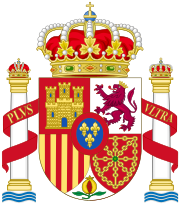| Royal Household | |
|---|---|
| Household of His Majesty the King | |
 Insignia of the Royal Household | |
| Role | Executive office of the King of Spain |
| Established | 16th century |
| Country | Kingdom of Spain |
| Responsible to | King Felipe VI |
| Head of the Household | Camilo Villarino |
| Secretary-General | Lt Gen. Domingo Martínez Palomo |
| Court Marshal and Aides-de-Champ | Gen. of Air Emilio Gracia Cirugeda |
| Constitution instrument | 1978 Constitution (Current household) |
| Previous name | Royal Household and Heritage of the Crown of Spain |
| Website | casareal.es |
 |
|---|
The Royal Household of Spain, officially the Household of His Majesty the King (Spanish: Casa de S.M. el Rey), is the constitutional body whose primary function is to provide aid and support to the King of Spain in the exercise of his royal duties and prerogatives.[1] These include his role as head of state[2] and as commander-in-chief of the Spanish Armed Forces.[3] It functions as the king's executive office.
The household is under the direct authority of the King, who personally selects the individuals he chooses to aid him in his constitutional duties. It is a constitutional institution, as laid down in Spain’s constitution of 1978. While the household is part of Spain’s governmental structure, it is not under the control or influence of any other state institution. The household ensures that the King has the independent means to perform all of his state functions. In particular, it is not under the administrative control of the Prime Minister or the Council of Ministers. The only authority to whom it answers is the King himself.
One of the household's primary functions is to facilitate communications between the King and the other state authorities. It is responsible for written and oral communications between the King and the government departments. It organizes and schedules meetings between the King, the Prime Minister, Ministers, Deputy Ministers, State Secretaries, Under Secretaries and other officials.
Its budget, like those of the Office of the Prime Minister, the Council of Ministers, the Supreme Court, the Armed Forces and many others, is approved by the houses of the Spanish Parliament on a yearly basis.
- ^ "The Spanish Constitution" (PDF).
- ^ "The Spanish constitution, Article 56 paragraph one" (PDF). 1978.
- ^ "The Spanish constitution, article 62 H." (PDF).